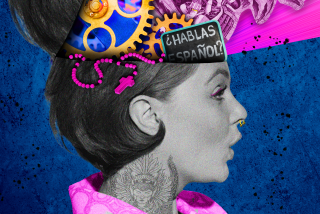PERSPECTIVE ON THE QUINCENTENNIAL : 1492 Brought Genocide; Why Celebrate? : Columbus’ ‘discovery’ launched a terrible chapter in human history, and millions still suffer the effects.
The 500th anniversary of Columbus’ first voyage to America--the Quincentennial--is two years away, but the observances and the controversy have already begun. Earlier this month, the National Hispanic Quincentennial Commission held its first conference under the banner “500 Years of Pride.” But other groups throughout the Americas plan a convocation in Ecuador to celebrate 500 years of indigenous resistance.
With such diametrically opposed interpretations, 1992 looms not as a period of healing and understanding but as a time of explosive conflict.
For the indigenous and mestizo populations throughout the Americas, the year 1492 marks one of the bloodiest chapters in the annals of human history. Particularly objectionable is the philosophical basis that makes possible the celebration of the Quincentennial--what they call the “Black Legend.” They see it as a rewriting of history, an Orwellian attempt to deny the genocide, the theft of land, the destruction of civilizations and the enslavement of the indigenous peoples of the Americas.
The “Black Legend” serves the purpose of absolving Spain of guilt by claiming that its colonization was humane and its atrocities no worse than those of England and other European colonial powers. But relativity is not a defense. Besides, who killed fewer “Indians,” or whose colonialism was more “civilized” is not the issue. The fact is that many millions of people in the Western Hemisphere were killed in the Spanish monarchy’s pursuit of empire.
Bartolome de las Casas, a Dominican friar who chronicled the brutality of the Spanish Conquest, estimated in 1540 that approximately 25 million indigenous people had been killed from the MesoAmerica and Caribbean areas less than 50 years after Columbus’ first voyage. His detractors to this day claim that De las Casas not only exaggerated, but that his work was promoted by the English as anti-Spanish propaganda. Some critics say that there were not that many indigenous people alive in all of the Americas; others, while ceding that many people perished, claim that the majority died of disease during the “encounter” with Europeans, not from brutality.
Roxanne Dunbar-Ortiz, a Native American historian at Cal State Hayward, says that new evidence, based on agricultural studies, suggests that as many as 100 million indigenous people were killed. She says that it was a case of genocide--of scorched-earth policies, malnutrition, starvation and the resultant diseases--not simply a result of European “contact.”
Rodolfo F. Acuna, a Chicano historian at Cal State Northridge, argues that the number doesn’t matter. What he finds mind-boggling is the mere thought of celebrating genocide.
During the period of colonization, the Catholic Church, on paper, came to accept the indigenous as human beings, but only after conversion.
The church, which is participating in the Quincentennial, completely understands the meaning of the sword, and although repentant, it still seems to be unable to comprehend its role in the cultural genocide associated with its practices. To this day, Spain and the church have embedded in their psyches that they were sent by God to “civilize” the “savages” of the “New World” and save them from hell.
Indeed, that is what set Spain apart from other colonizers. In its efforts to “civilize,” it enlisted the church; the church, in its efforts to “save the Indians’ souls,” corraled the indigenous population into missions, wiping out their identity, Christianizing them, and essentially attempting to culturally transform them into Europeans.
The process taught the indigenous people to despise themselves. It taught them that Europe was the source of “civilization,” and that all things European were good and all things non-European were bad. It also taught the indigenous people, and then the mestizo, the concept of European racial superiority and the notion of racial purity.
The idea that the imposition of their beliefs upon entire peoples can somehow be construed as negative does not enter the realm of European consciousness. Neither does it bother Spain and its apologists that the genocide ushered in another of humanity’s saddest chapters--the introduction of African slavery into the Americas.
The objection to the Quincentennial is for more than historical reasons: The legacies of colonialism and enslavement are painfully still with us today.
Dunbar-Ortiz is perplexed: “Why can’t Spaniards, who suffered so much under the Franco dictatorship, not see that to celebrate is to glorify the onslaught of genocide and colonialism?”
Spain need not celebrate.
Mexico’s ambassador to the United States, Gustavo Petricioli, sees 1992 as marking a new era when the Americas will reach out and begin to share the richness of their peoples and cultures with the rest of the world.
And unlike Japan, which apologized to Korea this year for its 45-year occupation, or East Germany, which apologized this year to Jews worldwide for the Holocaust, Spain need not apologize.
It should simply use the occasion to teach the truth, so that genocide and colonization may never be a part of human history again.
Although historians disagree on the origins of the battle, it is regarded in Mexico as an unprovoked slaughter and the blackest mark against Cortes. It was a turning point against the Aztec leader Moctezuma, who had apparently planned to encircle Cortes and was stunned by the preemptive attack.
--From “The Course of Mexican History,” Michael C. Meyer and William H. Sherman, Oxford University Press, 1979.
More to Read
Sign up for Essential California
The most important California stories and recommendations in your inbox every morning.
You may occasionally receive promotional content from the Los Angeles Times.










